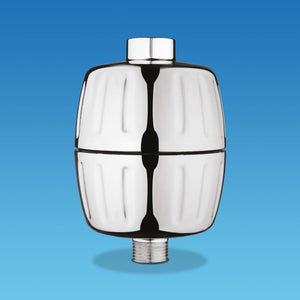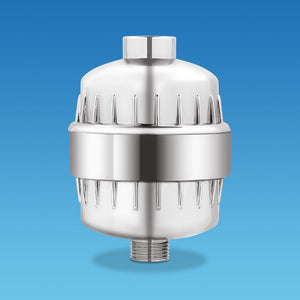A lot of people live in an area with hard water, and many find it more unpleasant to drink than soft water due to its mineral deposits. But what gives hard water its mineral buildup, and how does hard water affect your hair?
In this article, we explore the roots of hard water, how it affects hair and scalp, and how AquaBliss showerhead filters can prevent uncomfortable scalp issues.
Is Hard Water Bad For Your Hair?
All natural water contains dissolved minerals, but some of the more common minerals found in hard water areas, like calcium and magnesium, quickly form into hard mineral deposits. When this mineral buildup is exposed to your hair and scalp over time, it can quickly begin to cause hair damage and scalp issues.
What Does Hard Water Do To Your Hair?
It can be surprising to learn just how many scalp issues and damaged hair problems can arise from the build-up of minerals when you wash your hair. Below, we highlight some of the serious scalp issues caused by hard water and explore the effects of hard water on hair.
Fades Color

High concentrations of mineral deposits in water create a strong bond with your hair, making a film around each strand that prevents moisture from reaching your hair and follicles.
As the moisture is kept away from your hair, it becomes dehydrated, and its color begins to fade over time. If you have color-treated hair, you can find that your new colors are not taking as well and do not last as long as they used to.
Many people may even mistake their changing natural hair color for signs of aging when the hard water they wash their hair with every day is a primary culprit.
Flat and Dull Appearance
When hair is dehydrated, and the mineral buildup prevents your conditioner from working, your once shiny and voluminous hair can quickly become dull and flat in appearance.
Dry hair can become difficult to style, and you may be confused about why your best hair care products are no longer working well. Flat hair may also give the appearance of an oily scalp when it is actually dry.
People can often make this mistake and try to use harsher shampoos and hair products in a bid to volumize the hair.
Dry, Flaky, or Greasy Scalp

The scalp is delicate and has a very carefully balanced amount of oils and moisture to prevent drying and help your hair grow. When you rinse your hair with hard water, you can Adversely affect your scalp without realizing it. Dehydration from mineral buildup can quickly create scalp issues.
Harmful to Hair Growth
When the scalp is dry, and new hair growth is constantly coated in mineral deposits, it becomes difficult for that hair to grow and thrive. New hair growth needs the best possible conditions to become strong, shiny hair.
Brand-new hair can also struggle to grow when scalp conditions are poor, making skin irritation more likely. For hair loss to recover when you have hard water, it is vital to prevent exposure to chemicals associated with water that contains dehydrating minerals like calcium and magnesium deposits.
The Signs of Hard Water on Hair
Hard water contains mineral deposits that love to stick to things. We can often see evidence of this in our homes, as we see rings of mineral build-up around our bathtubs and toilets.
These minerals also leave visible signs of build-up on our hair and scalp. Below, we highlight some of the most common signs of hard water mineral buildup in the hair and scalp.
Hair Dryness

While dry hair eventually changes its appearance and shows signs of thinning and breakage, the early signs can often be felt with our fingers. We can even feel the result of hard water damage to our hair before any visible signs are present. Finding signs of hair and scalp dryness early is important for preventing any further damage.
Hair dehydration can also show up as:
- Dull hair
- Loss of color or quickly fading hair dye
- A flat appearance that becomes difficult to style
- Lack of “good hair days”
Hair Loss and Hair Thinning
After a long period of hard water damage to hair, signs of dehydration can lead to thinning of the hair shaft and eventual hair loss. As hair loss can feel traumatic and can even lead people to question their physical health, reversing this hard water damage as quickly as possible is vital for regaining healthy hair growth.
Frizziness
Dry hair can also feel rough to the touch and become tangled a lot easier than it used to. As dry hair breaks and splits, you may notice your hair becomes frizzy, unmanageable, and more painful to brush.
When this happens, people often turn to hair products to control frizz rather than focusing on the cause of this dryness and breakage. Making changes to prevent hard water buildup can prevent this unruly frizz.
Split Ends and Breakage
When mineral deposits coat every shaft of your hair, they prevent moisture from getting in. This dehydration can quickly start to create brittle hair strands that are prone to breaking when you brush, wash, or style your hair.
Breakage is not reversible, and for severely dehydrated hair, a shorter haircut is the only way to remove these rough, frizzy ends.
Scalp Irritation
Scalp irritation from hard water is preventable, but when it happens, it is extremely uncomfortable.
Your scalp can be dehydrated for a while before you start to notice any symptoms, but when you do, you may experience:
- Itching
- Flaking
- Redness
- Broken skin
- Sensitivity
Scratching irritated scalp skin can lead to further skin damage and problems with skin infections. Try to avoid scratching your itchy scalp whenever possible and look to soothing treatments instead.
How to Prevent the Effects of Hard Water on Hair
Clearing out mineral deposits from your hair and preventing them from building up in the future is vital for maintaining a healthy scalp and healthy hair growth.A whole house water softener can help, but that is not always possible or affordable.
Below, we highlight some of the best ways to help restore moisture to your hair and prevent potential scalp issues and hair loss in the future:
1. Install a shower head filter
The best way to reduce the chemicals associated with hard water deposits which can impact your hair and scalp is to prevent them from coming into contact with you skin. Using an advanced hard water showerhead filter like AquaBliss reduces chemicals and can filter loose mineral particles that build-up.
Filtering out loose mineral deposits and chemicals before they reach your scalp, you will notice the moisture and shine quickly returning to your hair. Working with both city water and mineral-dense well water, hair loss and breakage can be a problem of the past.
2. Rinse your hair with distilled water
Distilled water has no minerals and can help remove build-up from your hair and scalp. Deposits from hard water and soap build-up must be removed for your hair and scalp to fully recover.
When you rinse your hair with distilled water, no additional buildup can occur, letting your natural oils restore quickly to improve your hair growth and bring back your hair’s shiny luster.
3. Avoid heat styling
Heat is naturally drying to hair, causing breakage and eliminating moisture from your hair shaft. Heat styling for your hair can include:
- Hair straighteners
- Blow dryers using heat settings
- Heated rollers
- Curling tongs
When your hair and scalp are suffering from the dehydrating effects of hard water, it is best to avoid using heat while your hair recovers its natural oils. Instead of using heat, consider using moisturizing styling products to help your hair recover from damage.
Final Thoughts on How Hard Water Affects Your Hair
The effects of hard water on our hair can range from visible dullness to signs as distressing as potential hair loss. Treating our affected hair and scalp can help remove this mineral buildup, but preventing it in the future is the most vital piece of the puzzle.
Using a hard water shower filter can help prevent damaging chemicals from reaching your hair and scalp. Easily fitted to your current shower head, a shower filter can also help produce much more lather from your soap and shampoo, saving money on products over time.
When you live in a hard water area, you don’t need to live with it. Intentionally change your water with the simple addition of a filter today.
Note: "Chloramine (Chlorine+ammonia) is sometimes referred to as hard water. Chloramine is common in hard water and can cause hair loss, dry blotchy skin, and dull dry hair." Please have our Customer Service Team review your specific water quality report so they can assist you with recommending the best shower filter for your specific water conditions.








